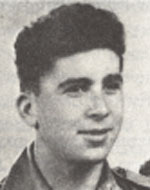Elioz, Reuven
Reuven (Rubka), son of Golda and Moshe, was born on January 6, 1941, in a Romanian novel, and immigrated to Israel with his family in 1951. He studied at Bialik Elementary School in Tel Aviv and then moved to Kibbutz Ma’ayan He also worked as a social guide and worked on the organization and absorption of new youth within the framework of the kibbutz, where he worked in the field of fishing, and as an art lover he often carved wood and painted. Reuven was drafted into the IDF in mid-February 1959 and assigned to the Golani infantry brigade. After completing basic training, he underwent a course for officers, and graduated with honors from the officers ‘course, and was assigned as a commander in the commanding officers’ school. In his opinion, his commander wrote: “Reuven an officer committed to his work, comfortable and friendly, takes care to improve achievements, is acceptable to his subordinates.” In 1962, Rubka was granted the rank of lieutenant and was appointed deputy commander of the Golani company. Three years later, his commander recommended that he should be promoted: “A quiet officer performs every task assigned to him in every field, in the best possible manner, with all outstanding talents in the command and training area. In 1965, Rubka was promoted to the rank of captain and returned to a school for commanders, this time as deputy commander of the school, during which he underwent a number of naval courses: a paratroop course, a infantry company commanders course, and a leadership and human relations course. Operated in the IDF Officers School. In 1966 he was appointed commander of the Golani reconnaissance unit. At that time, his commander wrote: “Captain Eliaz is an officer with a future that should be nurtured thoroughly and every effort should be invested in order to develop properly.” When the Six-Day War broke out, Rubka was stationed with his unit on the Golan Heights. During the war, his unit was caught in the Tel Faher area. Despite the fact that his unit was not intended to take part in the battle, he studied the situation on the ground, organized a number of half-tracks that had been abandoned and asked the brigade commander to assign him a combat mission. Captain Reuven was awarded the Medal of Honor and the honorable Commander of the Brigade, and after the Six-Day War he was promoted to the rank of Major and continued his position as Commander of the Regiment until his departure on a mission to Singapore. At the end of 1967, Robka and his family left Israel on an IDF mission to Singapore and after two years abroad returned to Israel and were accepted to the Command and Headquarters School. After completing his studies with honors, he was appointed deputy battalion commander in the Golani Brigade, and his commander wrote on his recommendation: “Reuven is able to find the right balance in handling operations and individual problems and maintenance. He was promoted to the rank of lieutenant colonel at the beginning of 1971. During his ten years of service in the IDF, Reuben came from the rank of lieutenant colonel to lieutenant colonel and battalion commander in Golani,l, He was also able to give concrete expression to his love of working the land, and he bought a farm in Bet-Yanai to work in agriculture, but did so without harming his position in the IDF and his family life. At the end of 1971 Reuven was appointed deputy commander of the Golani Brigade. During the Yom Kippur War, Rubka fought in the Golan Heights and took part in the battle against the Syrians. About a week after the outbreak of the war, on October 13, 1973, Reuven was killed by a mine explosion. He was brought to eternal rest in the cemetery in Kfar Vitkin. He left behind a wife, two children, parents, a sister and two brothers.
